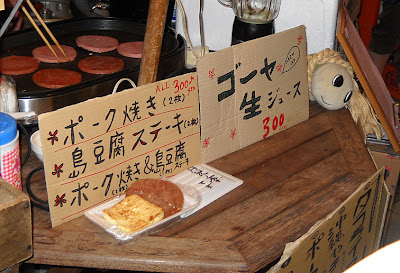I have two sets of memories of my life in Japan. Most of the posts that you see here reflect the view of it as someone who lived there for a long time and went through a lot of the stages that people love to say foreigners go through when living there. Basically, you start out infatuated and blind, turn bitter and disappointed, and eventually come to terms with the fact that Japan, like every other place in the world, has its good points and bad points.
The set of memories which have not reflected in this blog to date are the ones which fall into the category of those of a tourist. Yes, even I was once a tourist who saw everything through eyes caught by the shiny beauty of novelty (as did my husband). Since I'm back in the U.S., I'm finding the remnants of those early experiences and I want to start sharing them here. The difference between those memories and the ones I talk about here is that they are 23 years old, and many of the details of how I came to possess certain little scraps of paper or items are hidden too deeply and darkly in the memory closet to find them. This only points out how important it is for me to have written this blog. One day, when these memories are crammed too deeply into the recesses of my mind, it will be a refresher of my thoughts and feelings of life in Japan.

I've been going through old pictures that we have had in storage since leaving for Japan on our "three hour tour" in 1989. I'm digitizing them for posterity and there are other bits of memorabilia in the box. One of the things I came across was a box with a tea cup from my husband's stay there from 1988-1989 when he lived there alone. I showed him the cup (pictured here in two photos as the photo artwork wraps around it). He said that he had no memory of how he came to acquire it, but assumed it had been a gift from a student (likely one who visited an onsen) as its not the sort of thing he'd buy.
I looked the cup over and told him that I thought that it was what the Japanese might call a "sukebe" ("dirty" in a sex-related way) cup. He said he really didn't think so and I put it away for awhile. This morning, as I was getting near the bottom of pile of pictures for scanning, I decided to test my theory about the cup. My feeling was that the fence over the bathing maiden would vanish if you filled the cup with hot water. I'd seen these sorts of things before as a part of cheesy souvenirs in America a very long time ago.

Sure enough, the fence vanished when the cup got hot enough. To me, the interesting thing about this is not that there is some hint of sparely drawn female nudity. Frankly, the woman who is not hidden in the other part of the image has just as much cartoon breast showing. The point which seems very Japanese is that it's more about peeking behind the fence at something you're not supposed to see rather than simply seeing the nudity itself. In the U.S., these sorts of reveals usually show something far more overtly sexual and titillating (often a photo of a real naked woman). In the case of this cup, it seems more about a "naughty" invasion of privacy than a glimpse of forbidden flesh.
Note: This is a feature I'm going to indulge in, and I'm going to start allowing comments on this feature and see how it goes. Since I'm coming close to the end of my 1000 things, I figure I have the time and latitude to expand the range of this blog a bit. I hope my readers will enjoy these old memories interspersed among the regular posts. Thank you for reading and for your patience.
























